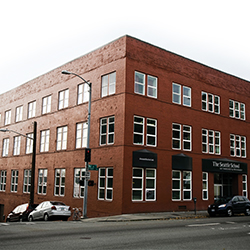“Learning takes your whole body. ” – Dr. J. Derek McNeil, President & Provost
Many of you have been drawn to this learning community at The Seattle School of Theology & Psychology by the conviction that the fullness of your being should be heard, met, and taken seriously. Along with this conviction comes a core belief that you yourself are one of the most valuable and important assets of any work that you step into. The Seattle School community honors the personal labor of formation and becoming just as much as the academic development of critical engagement and practical skill (which are both a part of formation as well). Who you are matters. As we like to say it, you can only accompany people as far as you have been willing to go yourself.
Formation is at the very heart of The Seattle School curriculum and experience, and we believe that you also need to be pursuing growth outside of our learning community–perhaps through participation in a faith community or perhaps through interactions with friends and family. In whatever ways you choose to lean into formation, may it be grounded in strong rhythms of self-care.
MACP Students
A significant part of your training and development as a therapist will happen outside The Seattle School, as a client in a therapeutic relationship. The Seattle School requires that you, as an MACP student, complete 40 sessions of psychotherapy with a licensed therapist to deepen your own self-understanding and spend time pursuing the work you will be asking of others. You’ll learn more about this in the weeks ahead, but know that this rhythm of self-care is intentionally woven into the MACP curriculum because we deeply value your journey.
MATC Students
In our degree programs at The Seattle School, we are forming leaders and practitioners who are relationally mature, growing in awareness, and courageously compassionate. So we highly encourage MATC students to find a therapist or spiritual director to journey with you through this formative time. During graduate school, you will be asked to reflect deeply on your story and how this has impacted your relational style. A gifted sojourner can come alongside you and help you do this work well.
Beyond Therapy and Spiritual Direction
We hope the rhythms mentioned above will be a meaningful part of your self-care as a student. We also know that holistically caring for ourselves is about much more than a task list or how we fill our calendars. In this, we’ve been inspired by the training and resources coming out of The Seattle School’s Center for Transforming Engagement. Their resilience framework identifies three streams of resilience—people, practices, and purpose—that are crucial to meaningful self-care. We pray that, in addition to the practice of therapy, spiritual direction, and self-care routines, you will also experience care through the people in this community, and through stepping closer to your future purpose as you equip yourself for it through learning and formation.
Seek out the ways you can care for yourself well, and know that they are likely as nuanced as your own story! Some of you may already have a good sense of this, while others may spend three to four years learning what self-care even is, and what the particularities of good self-care are for your personhood. We invite you to be always practicing. After all, learning at The Seattle School takes your whole body.


